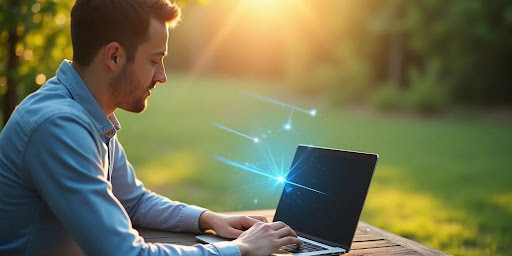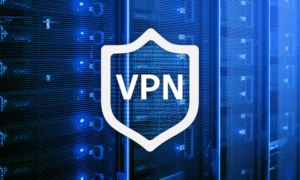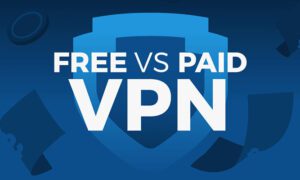In today’s digital world, protecting your online privacy is essential. A Virtual Private Network (VPN) is a powerful tool that can help you achieve this. This article will guide you through the basics of VPNs, how to choose the best VPN for your needs, and tips for setting one up, all tailored for beginners. Whether you’re worried about hackers or just want to access content from different countries, understanding VPNs is a great first step.
Understanding VPNs: The Basics
What is a VPN?
A VPN, or Virtual Private Network, is a tool that helps keep your online activities private. It creates a secure connection between your device and the internet. This means that your data is protected from hackers and other snoopers, especially when using public Wi-Fi.
How Does a VPN Work?
Think of the internet as a busy road. When you use a VPN, it’s like driving in a private car instead of a bus. Here’s how it works:
- Tunnel: Your data travels through a secure tunnel, making it invisible to others.
- Encryption: Your information is scrambled so that only the intended receiver can read it.
- Server: Your connection appears to come from the VPN server, not your actual location.
Why Use a VPN?
Using a VPN has several benefits:
- Privacy: It hides your online activities from your Internet Service Provider (ISP) and others.
- Security: It protects your data from hackers, especially on public networks.
- Access: It allows you to access content that may be restricted in your region.
Using a VPN is like having a private taxi that shields you from prying eyes while you travel online.
Choosing the Best VPN for Your Needs
When it comes to selecting a VPN, there are several important factors to keep in mind. Finding the right VPN can greatly enhance your online experience.
Factors to Consider When Selecting a VPN
- Ease of Use: Look for a VPN with a simple interface and easy setup. A one-click connect feature is ideal for beginners.
- Speed and Reliability: Choose a VPN that offers fast connections to avoid lag while streaming or gaming.
- Server Locations: A wide range of servers in different countries allows you to access content from various regions.
- Unblocking Capabilities: If you want to stream shows or movies, ensure the VPN can bypass geo-restrictions.
- Security Features: Essential features include a kill switch, leak protection, and a no-logs policy to keep your data safe.
Top VPN Providers for Beginners
| VPN Provider | Ease of Use | Speed | Price |
| ExpressVPN | Very Easy | Fast | $$ |
| NordVPN | Easy | Fast | $$ |
| Surfshark | Easy | Fast | $ |
| ProtonVPN | Moderate | Moderate | Free/Paid |
Free vs. Paid VPNs
- Free VPNs: Often have limitations like slower speeds, fewer servers, and may sell your data.
- Paid VPNs: Generally offer better security, faster speeds, and more features. They are worth the investment for serious users.
Choosing the best VPNs is crucial for your online safety and access to content. Take your time to research and find one that fits your needs.
Setting Up and Using a VPN
How to Install a VPN on Different Devices
Setting up a VPN is simple, but the steps can vary based on the device you are using. Here’s a quick guide for some common devices:
Windows
- Go to your VPN provider’s website and download the Windows installer.
- Open the downloaded file and follow the instructions to install.
- Launch the VPN, sign in, and connect to a server.
MacOS
- Visit your VPN provider’s website and download the MacOS installer.
- Open the file and follow the prompts to install.
- Start the VPN, log in, and choose a server.
Android
- Open the Google Play Store.
- Search for your VPN provider and tap install.
- Open the app, sign in, and select a server.
iOS/iPadOS
- Open the App Store.
- Search for your VPN provider and tap get.
- Open the app, sign in, and choose a server.
Tips for Using a VPN Effectively
To get the most out of your VPN, consider these tips:
- Always connect to a server before browsing. This ensures your data is protected.
- Choose a server close to your location for better speed.
- If you’re streaming, select a server in the country of the content you want to access.
Common VPN Issues and Solutions
Here are some common problems you might face with a VPN and how to fix them:
- Slow connection: Try connecting to a different server.
- Unable to access certain websites: Switch to a server in a different country.
- VPN not connecting: Restart the app or your device and try again.
Using a VPN can greatly enhance your online privacy and security. Make sure to choose a reliable provider and follow the setup instructions carefully.
Security and Privacy with VPNs
How VPNs Protect Your Data
Using a VPN is a smart way to keep your information safe online. A VPN hides your real IP address and encrypts your data, making it hard for anyone to see what you’re doing. Here are some key points about how VPNs protect your data:
- IP Masking: Your real IP address is hidden, so your online activities are harder to trace.
- Data Encryption: Your data is scrambled, making it unreadable to anyone who might intercept it.
- Secure Connections: VPNs create a secure tunnel for your data, protecting it from hackers and snoopers.
Understanding VPN Encryption
VPN encryption is crucial for your online safety. It ensures that your data is secure while traveling over the internet. Here’s a simple breakdown of how it works:
- Data Scrambling: Your information is turned into a code that can’t be easily read.
- Secure Protocols: Look for VPNs that use strong protocols like OpenVPN or IKEv2 for better security.
- Key Management: Encryption keys are used to lock and unlock your data, ensuring only you can access it.
| Encryption Type | Description | Strength |
| AES-256 | Advanced Encryption Standard | Very Strong |
| RSA | Used for secure data transmission | Strong |
| Blowfish | Fast and secure for smaller data | Moderate |
VPNs and Online Privacy
Using a VPN can greatly enhance your online privacy. Here are some benefits:
- Anonymity: Your online actions are less likely to be tracked.
- No Logs Policy: Choose a VPN that doesn’t keep records of your activities.
- Protection from ISPs: Your Internet Service Provider (ISP) can’t see what you’re doing online.
A VPN is not just a tool; it’s a shield that protects your online identity and keeps your data safe from prying eyes.
Advanced VPN Features and Benefits
Unblocking Content with a VPN
Using a VPN can help you access websites that might be blocked in your area. Here are some key points:
- Access blocked websites: If your school or workplace restricts certain sites, a VPN can help you bypass these blocks.
- Bypass regional restrictions: In some countries, access to popular sites like YouTube may be limited. A VPN allows you to get around these restrictions.
- Access geo-blocked content: Some services or offers are only available in specific regions. A VPN can change your virtual location, allowing you to access these benefits.
VPNs for Streaming and Gaming
VPNs can enhance your online entertainment experience:
- Stream without limits: Enjoy shows and movies from different countries.
- Reduce lag in gaming: Some gamers use VPNs to connect to servers closer to their location, improving speed.
- Access exclusive content: Certain games or shows may only be available in specific regions.
Additional Security Features
Many VPNs come with extra security options:
- Kill switch: This feature disconnects your internet if the VPN connection drops, keeping your data safe.
- Split tunneling: This allows you to choose which apps use the VPN and which use your regular internet connection.
- Obfuscated servers: These make it harder for others to tell you are using a VPN, which can be useful in restrictive areas.
A VPN not only protects your privacy but also opens up a world of content that might otherwise be out of reach.
Troubleshooting and Support for VPN Users
Common VPN Problems and Fixes
Using a VPN can sometimes lead to issues. Here are some common problems and their solutions:
- Connection Issues: If you can’t connect to the VPN, try restarting your device or switching servers.
- Slow Speeds: If your internet is slow, try connecting to a different server or check your internet connection.
- Blocked Websites: If a website is still blocked, clear your browser’s cache or try a different server.
Where to Find VPN Support
Most VPN providers offer various support options. Here are some common ways to get help:
- Live Chat: Many VPNs have 24/7 live chat support for quick assistance.
- Email Support: You can send an email to the support team for help with specific issues.
- Help Center: Check the provider’s website for FAQs and guides.
Understanding VPN Logs and Policies
It’s important to know how your VPN handles your data. Here are key points to consider:
- No-Logs Policy: Ensure your VPN does not keep logs of your online activity.
- Data Encryption: Check if your VPN uses strong encryption to protect your data.
- Privacy Policy: Read the privacy policy to understand how your information is used and stored.
Remember, having good support options is crucial. Look for the good VPN 2024 that offers multiple ways to get help, like live chat, email, and a detailed help center.
Final Thoughts on VPNs for Beginners
In conclusion, using a VPN is a smart choice for anyone who wants to keep their online activities private and secure. It acts like a shield, protecting your personal information from hackers and other snoopers. Whether you’re browsing the web, streaming videos, or just checking your email, a VPN helps keep your data safe. Remember, not all VPNs are the same, so take your time to find one that fits your needs. With the right VPN, you can enjoy a safer and more private internet experience.
Frequently Asked Questions
What is a VPN and how does it work?
A VPN, or Virtual Private Network, is a service that creates a secure connection over the internet. It hides your online activity by routing your data through a private server, making it hard for others to see what you’re doing.
Are VPNs safe to use?
Yes, most VPNs are safe if you choose a reliable provider. They protect your data and privacy by encrypting your information, which makes it difficult for hackers or snoopers to access.
Can I use a VPN for free?
Yes, there are free VPNs available. However, they often have limitations in speed and security compared to paid options. It’s usually better to invest in a good paid VPN for better protection.
Do I need a VPN for streaming?
Using a VPN can help you access content that may be blocked in your area. It can also improve your streaming experience by providing faster connections.
Is using a VPN legal?
In most places, using a VPN is legal as long as you don’t use it for illegal activities. However, some countries have restrictions on VPN use.
How do I choose the right VPN for me?
Look for a VPN that is easy to use, has good customer support, and offers strong security features. Check reviews to find one that fits your needs.



































